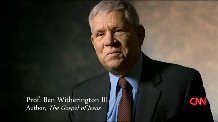The world of academia is a bit like a circus. There are main acts and side shows. There are barkers drawing attention to themselves, and others who are not on ego trips at all. There are actually truth seekers, but their are also job seekers. There are careful scholars and careless scholars. There are scholars with axes to grind, and scholars who are genuinely open to learning new things. Imagine that. I must admit that sometimes I am naive about who’s who in the zoo, and my default is to assume that we are all in this enterprise for the sake of advancing knowledge of the Bible and cognate subjects. It isn’t always true. Still I find it disconcerting when some scholars deliberately bend the evidence to create an effect. For some reason this seems to happen a good deal in text criticism. Outlandish claims are made about this or that or the other papyrus find, or long lost manuscript, or scribal tendency. Sensationalism sells. On closer scrutiny, such claims are often enormously exaggerated. I offer some examples.
Let’s take the claim that orthodox Christian scribes deliberately changed readings in the Greek manuscripts in order to ‘create’ orthodoxy where it did not exist before. Let’s first admit, there were a few squirrely scribes, and some who fudged some things to conform to whatever standards of correct think they subscribed to. Yes there were. However, and this is the important thing, there is no evidence at all from any of the papyri that any major Christian belief was invented this way and is not a part of the original text of the Greek NT. There were plenty of scrupulous and careful scribes as well, and we have more than enough evidence to show that nothing of significance arose as a result of later unscrupulous scribes cooking it up.
The claim of later invention of ideas is not true of the notion that Jesus was part of the Godhead, it is not true of the virginal conception, it is not true of the crucifixion, it is not true of the bodily resurrection of Jesus, it is not true of the appearances of the risen Jesus to a variety of people, including at least two who had not believed in him before hand, it is not true of the notion that the Holy Spirit is in fact a person and part of the Godhead, it is also not true of the raw data for the Trinity. The Father, the Son, and the Spirit are all identified as part of the divine identity of the one God in various places (for example Jesus is called God some seven times in the NT, including in some of our earliest evidence. It is simply false that ‘Jesus became God’ in the later thinking of fuzzy thinking Christians. No, from the outset Jesus was prayed to and worshipped by Jews who believed only God should be prayed to and worshipped). In all these cases of course, there was a taking of the data in the NT documents and a later attempt to systematize what belief in these things meant and didn’t mean at the ecumenical councils at Nicaea in 325 and elsewhere. But orthodoxy was not invented in the post NT age. It is already present in our earliest copies of the earliest Greek manuscripts we have written by our earliest Christian writers. That is simply a fact.
And to the point about sensationalism, consider the recent brouhaha about the so-called ‘Gospel of Jesus’ wife’. This document may well be, in fact there is mounting evidence it is, a forgery. But even if it is not, it is a document with huge holes and therefore lacunae in it. When you have a sentence attributed to Jesus in a creative Gnostic document that even Karen King is warning us does not tell us anything about the historical Jesus’ life. which begins “My wife….” and then there is a gap or a hole in the papyrus, it is germane to point out that the sentence could be completed in a myriad of ways such as “My wife, if I had one….” or “My wife? What do you mean my wife? I’ve never had one” and so on. This whole nonsense about Jesus being married, it is well to remind ourselves, began with the ultimate conspiracy theory novel The Da Vinci Code which had some 150 historical errors in it and was closer to hysterical fiction than to historical fiction.
So you see where suspicion of orthodox claims about Jesus or the Christian faith coupled with a profound willingness to be naive about outlandish claims about Jesus can lead you. It can lead you down the path of truthiness, but not down the path of truth.













